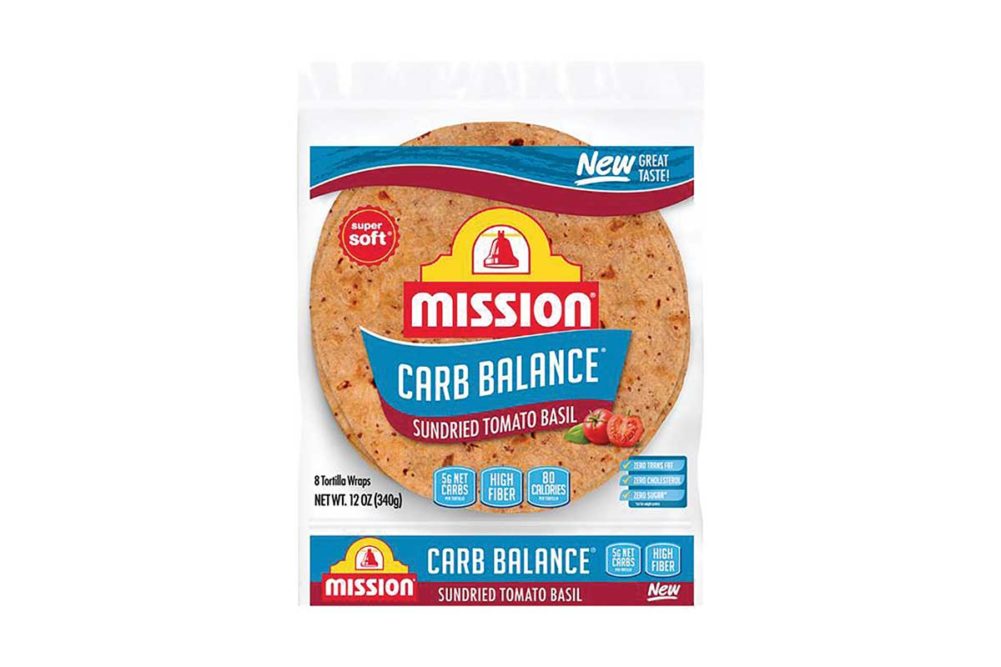While consumers typically perceive flatbreads and tortillas as having fewer carbs than a typical slice of bread or a bun or roll, there is still a movement to see how low carb these products can get.
“Center-store tortilla and taco kit growth is being driven by Mission Foods, private label and Guerrero,” said Melissa Altobelli, senior vice president, client insights, dairy and bakery vertical, Circana. “Both Mission’s and Guerrero’s growth are from the launch of zero net carb sub-brands. Mission Carb Balance — 2 grams of net carbs — also continues to show growth.”
While these low carb options are growing, she quickly pointed out, however, that regular and original tortillas and flatbread varieties still account for the majority of sales.
“I would expect continued expansion in BFY options, which are driving growth in the tortilla category in particular,” she said.
And that seems to be where innovation is carrying the category. Gruma brand Mission Foods debuted its Zero Net Carbs line in 2022 with Original and Sundried Tomato Basil and expanded it in 2023 with a Sriracha Ranch variety. For its Carb Balance portfolio, for the carb-conscious consumer, Gruma, Monterrey, Mexico, added a Chipotle fajita-sized tortilla with 1 gram of net carbs per serving and a Flour burrito-sized tortilla with 4 grams of net carbs.
In its Q3 2023 earnings call with investors, Gruma characterized the demand for products as quite positive, especially the BFY portfolios. In the United States specifically, the 2% sales volume growth for the tortilla business was driven by Gruma’s BFY product line and corn-related tortilla products.
Other brands have also taken notice. Toufayan Bakeries, Ridgefield, NJ, launched its own keto-friendly pita, wraps and flatbread in 2022 and expanded distribution of that line in 2023.
“At Toufayan Bakeries, we are committed to staying ahead of consumer trends and providing great-tasting products that align with a wide variety of dietary preferences,” Karen Toufayan, vice president, marketing, Toufayan Bakeries, told BakingBusiness.com. “The popularity of the keto diet presented an exciting opportunity for us to meet the evolving needs of our consumers. We’re really proud of these great-tasting breads made by our family for yours.”
While low carb and keto may be the health darlings of the moment, the definition of BFY extends beyond carbohydrates, even for a bakery product, which opens up a wealth of options for brands and formulators. In addition to keto-friendly options, Gruma’s Mission Foods brand has launched protein-enhanced tortillas that also deliver a lot of fiber. The brand also offers gluten-free tortillas that feature traditional corn, cauliflower base or a flour tortilla alternative.
“Just like in other categories, BFY has been driving a lot of growth in the tortilla category,” Carillo said. “There are multiple brands that have been innovating for a long time with attributes like gluten-free, low carb and added fiber, which make consumers feel better about incorporating tortillas into their meals.”
Tia Lupita Foods, Tiburon, Calif., was first founded as a hot sauce company to bring founder Hector Saldivar’s mother’s hot sauce to the United States. The company expanded into BFY tortillas so that everyone could enjoy tacos without the guilt. The company’s reduced carb and calorie tortillas are made from cactus flour.
“Consumers love tortillas for their tacos, burritos and wraps, but they are also watching what they eat, which means brands need to find a way to deliver the right balance of flavor and nutrition just like we did at Tia Lupita,” explained Jose Carillo, head of marketing, Tia Lupita Foods.
The company also partnered with Renewal Mill to bring upcycled okara (soy pulp) flour into the formulation to go a step further and make the products more sustainable. Carillo believes that alternative flours like cactus and okara are here to stay, though he admits only some will have staying power.
“Alternative flours like almond, coconut, chickpeas, cassava and, in our case, cactus flour are leading the charge to deliver grain-free alternatives,” he said. “But there are also brands taking the approach of adding ingredients like turmeric, herbs and spinach to justify BFY claims. I think alternative flours are here to stay, and flavor innovation will continue, but I don’t see many of those products sticking around for too long.”
These alternatives can require some education through packaging, marketing campaigns and even influencers on social media. The more products adopt these ingredients, however, the more staying power they can garner. The good news for Tia Lupita and other brands like it is that health-conscious consumers are willing to try new items, and they’re loyal, which can be a blessing and a curse.
“BFY consumers are not afraid of trying new ingredients and products; they are adventurous,” Carillo said. “The challenge is that once they find a product they love, it is hard to make them switch. So, the learning curve is steep because there is a need to break existing habits, plus the higher price point of this type of product is also a barrier. The consumer thinks, ‘That sounds good, but it’s not cheap. What if I buy it and I don’t like it?’ ”
This article is an excerpt from the March 2024 issue of Baking & Snack. To read the entire feature on Tortilla and Flatbreads, click here.






